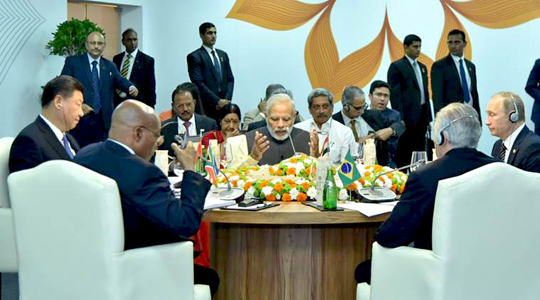Benaulim (Goa), Oct 16: Talking tough on Pakistan at the BRICS Summit, Prime Minister Narendra Modi today said the "most serious" direct threat to regional security was terrorism, whose "mothership" was a country in India's neighbourhood.
 The Prime Minister also said that country nurtures a mindset that loudly proclaims that terrorism is justified for political gains.
The Prime Minister also said that country nurtures a mindset that loudly proclaims that terrorism is justified for political gains.
Addressing Russian President Vladimir Putin, Chinese President Xi Jinping, Brazilian President Jacob Zuma and South African leader Michel Temer at the BRICS Summit's "restricted" segment, Modi said terror modules around the world are linked to this "mothership".
"In our own region, terrorism poses a grave threat to peace, security and development. Tragically its mothership is a country in India's neighbourhood. Terror modules around the world are linked to this mothership," he said.
"This country shelters not just terrorists. It nurtures a mindset. A mindset that loudly proclaims that terrorism is justified for political gains. It is a mindset that we strongly condemn.
"And, against which we as BRICS need to stand and act together. BRICS must speak in one voice against this threat," Modi said, without naming Pakistan directly.
During his bilaterals with Putin and Xi yesterday, Modi had strongly articulated India's concerns over terrorism emanating from Pakistan.

The Prime Minister stressed that those supporting terror should be punished.
"We are united in our belief that terrorism and its supporters have to be punished, not rewarded," he said.
The Prime Minister also asked BRICS countries to work together for early adoption of the Comprehensive Convention on International Terrorism (CCIT) by the UN to tackle the menace and step up practical cooperation against terrorism.
Observing that BRICS nations have been a voice for peace, reform, reason and purposeful action, he said, "If new drivers of growth have to take root, there must be unhindered flow of skilled talent, ideas, technology and capital across borders
.
Talking about critical challenges that the world is confronted with, he said there was a need for a clear roadmap to revive the global economy.
"We have built new global institutions to complement the existing architecture. The NDB & Contingency Reserve Arrangement stand out," he added.
Referring to India recently ratifying the Paris Climate Agreement, he said, "We are committed to a harmonious balance between development and climate change. The path laid down by the SDGs or agenda 2030 is a valuable blueprint of hope. India's own development priorities are aligned with them."
Modi concluded his remarks by mentioning non-conventional security challenges, from threats on cyberspace and piracy on high seas to human trafficking.






Comments
Dear CD,
Please correct, President of South Africa is Jacob Zuma and Brazilian President is Michel Temer.
Add new comment